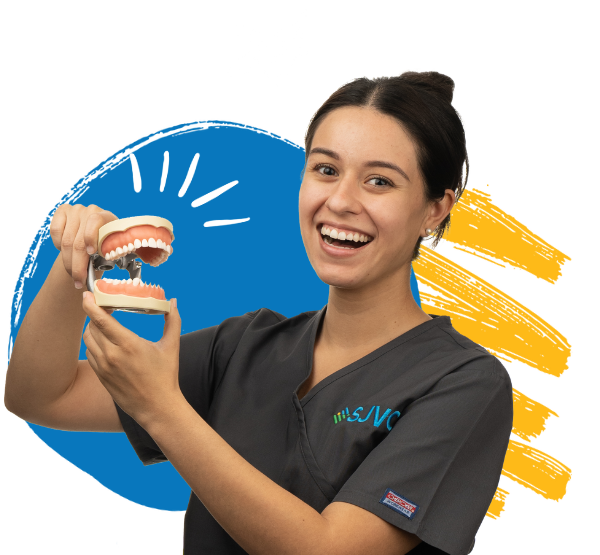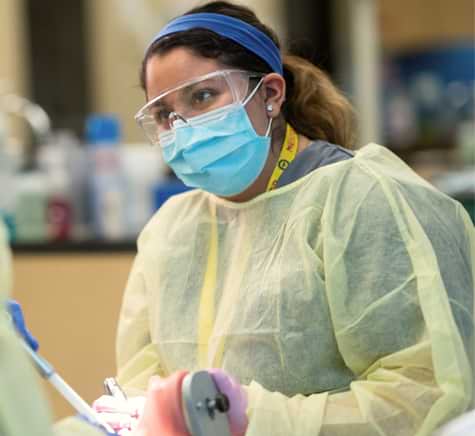Dental Hygiene
SJVC’s Dental Hygiene program prepares graduates to work with Dentists in providing patients’ dental treatments and health practices. Earn an Associate of Science Degree in as few as 16 months.

REAL-WORLD SKILLS
START YOUR PATH
FLEXIBLE LEARNING OPTIONS
AFFORDABLE TUITION

Program Details
WHAT WILL I LEARN?
Our Dental Hygiene students learn to:
- Identify each patient’s physical and oral health status by collecting patient data through a process of comprehensive patient assessment procedures
- Analyze assessment findings and use critical thinking in order to address the patient’s dental hygiene treatment needs
- Establish a dental hygiene care plan that reflects the realistic goals and treatment strategies to facilitate optimal oral health
- Provide patient-centered treatment and evidence-based care in a manner minimizing risk and optimizing oral health
- Measure the extent to which goals identified in the dental hygiene care plan are achieved
- Complete and accurately record all documentation relevant to patient care
- Adapt to changes in demographics and cultural diversity in dental hygiene practice and health care delivery
- Interact with the dental community and professional organizations for professional growth and lifelong learning
Benefits of SJVC’s Dental Hygiene program include:
- Comprehensive instruction
- Small class sizes
- The program in Dental Hygiene is accredited by the Commission On Dental Accreditation. The Commission is a specialized accrediting body recognized by the United States Department of Education. The Commission on Dental Accreditation can be contacted at (312) 440-4653 or at 211 East Chicago Avenue, Chicago, IL 60611-2678. The Commission’s web address is coda.ada.org.
Our Dental Hygiene students can earn an Associate of Science degree in as few as 16 months. Graduates are eligible to take the National Board written examination and a State and/or Regional Board Examination for licensure as a Registered Dental Hygienist. SJVC prepares students to take appropriate certification and licensure exams related to their individual majors. The College does not guarantee students will successfully pass these exams or be certified or licensed as a result of completing the program.
If you’re in search of Dental Hygiene programs in Ontario and Visalia, consider our Dental Hygiene program at SJVC. Each campus houses a fully-equipped clinic for Dental Hygiene students, enabling them to get hands-on instruction working with actual patients and gain real-world experience while completing their studies. All services performed at the Dental Hygiene clinic are provided by Dental Hygiene students under the direct supervision of Dental Hygienists and/or supervising Dentists. View SJVC’s Dental Hygiene Clinic’s Policy on Bloodborne Pathogens.
Application Process
Military Policy
COST & FINANCIAL AID
Education is the most important investment you can make in your future. There is a financial plan available for everyone, including a broad range of financial assistance options. Visit SJVC’s Net Price Calculator to get personalized information on college costs and financial aid. Check out SJVC’s Academic Catalog to learn about program costs by campus and credential level. You also can talk to an Admissions Advisor to discuss the costs of your chosen program and schedule an appointment with an experienced financial aid officer. Student loans, grants, and scholarships are available to those who qualify.
PROGRAM AVAILABILITY
We’re proud to offer comprehensive Dental Hygiene education at two locations:
More information on pre-requisite courses is available here: www.sjvc.edu/admissions/admissions-requirements/prerequisite-courses-faqs.
ACCREDITATION & APPROVALS
The Dental Hygiene program is accredited by The American Dental Association’s Commission on Dental Accreditation (CODA) and has been granted the accreditation status of “approval without reporting requirements.” The Commission on Dental Accreditation can be contacted at (312) 440-4653 or at 211 East Chicago Avenue, Chicago, IL 60611-2678. The Commission’s web address is coda.ada.org.
The SJVC Dental Hygiene program is approved by the Department of Consumer Affairs, Dental Hygiene Board of California.
Commission on Dental Accreditation
211 East Chicago Ave
Chicago, IL 60611-2678
(312) 440-4653 | coda.ada.org
Department of Consumer Affairs, Dental Hygiene Board of California (DHBC)
2005 Evergreen Street, Ste. 2050
Sacramento, CA 95815
Phone: (916) 263-1978 Fax: (916) 263-2688 | dhbc.ca.gov
Institutional Accreditation
San Joaquin Valley College is accredited by the WASC Senior College and University Commission (WSCUC), 1080 Marina Village Parkway, Suite 500, Alameda, CA 94501, (510)748-9001.
The WSCUC is an institutional accrediting body recognized by the Council for Higher Education Accreditation and the U.S. Department of Education.
State Approvals
CALIFORNIA
SJVC is a private institution and is approved to operate as an accredited institution by the California Bureau of Private Postsecondary Education (BPPE). Approval to operate means that SJVC has been found in compliance with the standards set forth in the California Private Postsecondary Education Act of 2009 (as amended) and Title 5, Division 7.5, – Private Postsecondary Education of the California Code of Regulations. As a prospective student, you are encouraged to review this catalog prior to signing an enrollment agreement. You are also encouraged to review the School Performance Fact Sheet, which must be provided to you prior to signing an enrollment agreement.
A student or any member of the public may file a complaint about this institution with the Bureau for Private Postsecondary Education by calling (888) 370-7589 or by completing a complaint form, which can be obtained on the Bureau’s internet website. (www.bppe.ca.gov)
CONTINUING EDUCATION FOR GRADUATES
What Will I Learn?
Oral Radiology
Head & Neck Anatomy
Oral Biology
General & Oral Pathology
Ready to Do This?
Discover What It’s Like to Become a Dental Hygiene Student

Career Opportunities
In many situations, when a patient goes to the Dentist for a routine checkup, he or she will spend the majority of his or her appointment with the Dental Hygienist. Registered Dental Hygienists perform several tasks with patients, according to the U.S. Bureau of Labor Statistics, including:1
- Performing preventative procedures to remove tartar, stains, and plaque
- Applying sealants and fluoride to protect teeth
- Taking radiographs
- Assessing patients’ health and working in conjunction with the dentist for overall patient care
- Documenting patients’ care and treatment plans
- Educating patients about oral hygiene techniques
To perform these tasks, Dental Hygienists use several types of equipment, including hand, power, and ultrasonic tools, according to the BLS. They also use X-ray machines to scan patients for tooth and jaw problems.1
Dental Hygienists also talk with patients one-on-one to discuss good oral hygiene practices, the link between their diet and oral health, and how their oral health can impact their overall well-being. They may also make recommendations for types of toothbrushes, toothpaste, and floss to use, and demonstrate how to correctly use these products.1
Check out our guide on Dental Hygiene in California
Do you have an interest in dental health and oral hygiene? Then you should consider pursuing a Dental Hygiene career. As a Dental Hygienist, you will play a pivotal role in the dental office and in each patient’s oral health as you perform routine care, discuss preventative measures, and screen for dental diseases.
Successful Grads
Ask one of our 60,000+ graduates about their SJVC experience and they’ll likely describe it as life-changing.
Want to Learn More?
Request Information
All fields using an asterik (*) are required.
Our RN to BSN program is a Bachelors degree completion option for Registered Nurses.
Dental Hygiene FAQ
-
What Does a Dental Hygienist Do?
Dental hygienists perform essential services during a patient’s dental appointment. Dental Hygienists typically do the following:
- Remove tartar, stains, and plaque from teeth
- Apply sealants and fluorides to help protect teeth
- Take and develop dental x rays
- Assess patients’ oral health and report findings to dentists
- Document patient care and treatment plans
- Educate patients about oral hygiene techniques, such as how to brush and floss correctly.1
-
How Long Does It Take to Become a Dental Hygienist?
At SJVC, it can take about 16 months to complete the Dental Hygiene program and achieve an Associate of Science degree. Graduates are eligible to take the National Board written examination and a State and/or Regional Board Examination for licensure as a Registered Dental Hygienist. SJVC prepares students to take appropriate certification and licensure exams related to their individual majors. The College does not guarantee students will successfully pass these exams or be certified or licensed as a result of completing the program.
-
What Requirements Do I Need to Meet to Become a Dental Hygienist?
To become a Dental Hygienist, you need to first meet the education requirements. This can include obtaining an Associate or Bachelor’s degree in Dental Hygiene. In addition to getting a degree, you also must pass licensure exams. A license is required in every state to become a practicing Dental Hygienist.2
-
What Dental Hygienist Prerequisites Must I Meet?
At SJVC, to apply for the Dental Hygiene program, you must take a required list of prerequisite courses at an accredited institution, including General/Inorganic Chemistry (with lab), General Microbiology (with lab), Human Physiology (with lab), General Psychology, Introduction to Sociology, and Intermediate Algebra or higher. You must receive at least a “C” grade and an overall GPA of 2.75 or higher. Please see the academic catalog for additional details.
